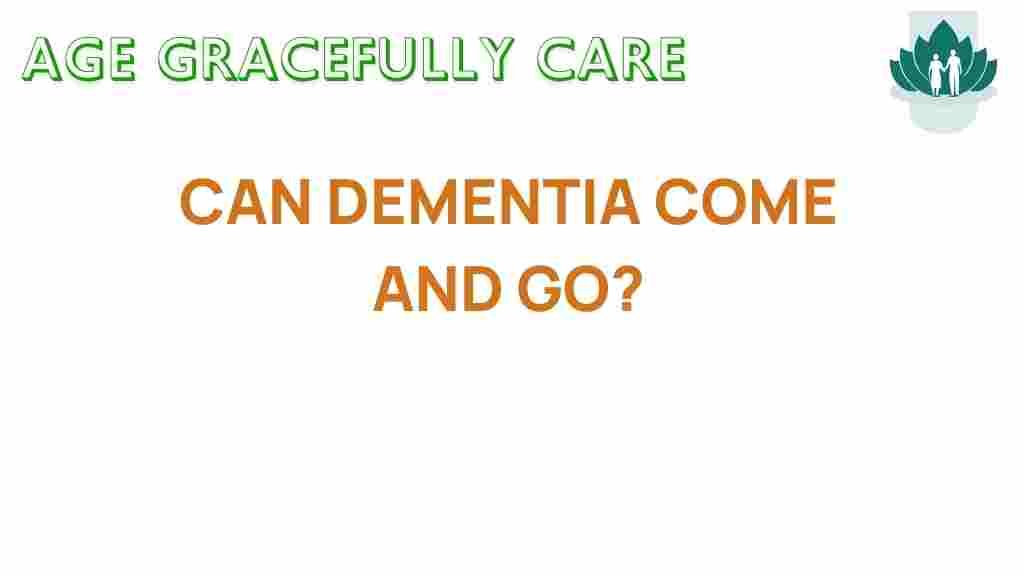Can Dementia Truly Come and Go?
Dementia is often viewed as a progressive decline in cognitive function, but many individuals and families have reported experiences that suggest symptoms can vary significantly over time. In this article, we will explore the complexities of dementia, particularly focusing on its episodic nature, associated symptoms, and strategies for maintaining brain health. By unraveling the mystery of cognitive decline and memory loss, we aim to shed light on this often-misunderstood neurological condition.
Understanding Dementia and Its Symptoms
Dementia encompasses a range of symptoms that affect memory, thinking, and social abilities severely enough to interfere with daily life. According to the World Health Organization, dementia is a syndrome that can result from various neurological conditions, the most common being Alzheimer’s disease.
Common symptoms of dementia include:
- Memory loss
- Difficulty in communicating
- Disorientation and confusion
- Impaired judgment
- Changes in mood and behavior
- Difficulty with abstract thinking
Understanding these symptoms is crucial for early diagnosis and effective care strategies. However, it’s important to note that the manifestation of these symptoms can fluctuate, leading to the perception that dementia might come and go.
The Nature of Cognitive Decline
Cognitive decline is not always linear. Many people experience fluctuations in their cognitive abilities, which can be influenced by various factors:
- Emotional well-being: Stress, anxiety, and depression can exacerbate symptoms of dementia, affecting memory and mental clarity.
- Physical health: Illness, fatigue, and even dehydration can lead to temporary cognitive impairment.
- Medications: Certain medications can cause side effects that mimic or worsen dementia symptoms.
- Environmental factors: Changes in surroundings or routine can lead to confusion and memory loss.
Episodic Dementia: A Closer Look
Episodic dementia is a term that refers to the episodic nature of cognitive decline. Some individuals may experience periods of relative clarity interspersed with times of significant memory loss and confusion. This phenomenon can make it confusing for caregivers and loved ones attempting to understand the condition.
Factors contributing to episodic dementia may include:
- **Medical conditions:** Underlying health issues such as infections or metabolic imbalances can trigger temporary cognitive decline.
- **Lifestyle changes:** Changes in routine, diet, or sleep patterns can affect brain health and lead to fluctuations in cognitive function.
- **Social interactions:** Engaging socially can sometimes temporarily alleviate symptoms, while isolation may worsen them.
Strategies for Maintaining Brain Health
While dementia and cognitive decline may feel overwhelming, there are several strategies individuals and caregivers can implement to promote brain health and enhance mental clarity:
- Engage in regular physical activity: Exercise increases blood flow to the brain and can improve cognitive function.
- Maintain a balanced diet: A diet rich in fruits, vegetables, whole grains, and healthy fats supports brain health.
- Stay mentally active: Puzzles, reading, and engaging in new hobbies can help maintain cognitive function.
- Foster social connections: Regular interaction with friends and family can help mitigate feelings of loneliness and support mental well-being.
- Get adequate sleep: Quality sleep is essential for memory consolidation and overall brain health.
Care Strategies for Dementia
Effective care strategies are vital for those affected by dementia. These strategies can help manage symptoms and improve quality of life:
- Establish routines: Providing a structured daily routine can reduce confusion and anxiety.
- Use visual aids: Labels, calendars, and reminders can assist with memory loss.
- Encourage independence: Allowing individuals to retain some autonomy can promote dignity and self-esteem.
- Be patient and empathetic: Understanding that cognitive decline can vary day-to-day is essential for effective communication and support.
Troubleshooting Tips for Caregivers
As a caregiver, you may encounter challenges while managing the care of someone with dementia. Here are some troubleshooting tips:
- Addressing memory loss: If your loved one frequently forgets names or faces, gently remind them or provide visual cues without expressing frustration.
- Dealing with confusion: If they appear disoriented, calmly guide them back to familiar surroundings or routines.
- Managing mood swings: Recognize that fluctuations in mood may be related to cognitive changes; providing reassurance can be helpful.
- Communication difficulties: Simplify your language and ask yes or no questions to facilitate understanding.
Conclusion
In conclusion, while dementia is often characterized by progressive cognitive decline, many individuals experience fluctuations in their symptoms that can feel like the condition comes and goes. Understanding the episodic nature of dementia and the various factors influencing cognitive function is essential for caregivers and families navigating this challenging journey.
Promoting brain health through exercise, diet, mental stimulation, and social engagement can help mitigate some symptoms of dementia. Furthermore, employing effective care strategies can enhance the quality of life for those affected. If you or a loved one is experiencing symptoms of dementia, consult with a healthcare professional to explore diagnosis, treatment options, and support resources.
For more information on dementia and its management, consider visiting Alzheimer’s Association for valuable resources and support. Additionally, you can find tips on maintaining mental clarity and brain health at Mental Health Foundation.
This article is in the category Health and created by AgeGracefullyCare Team
